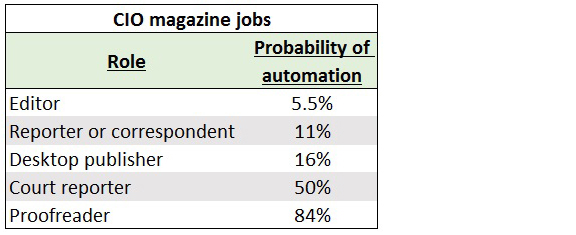Automatons for the People
The idea for “A Robot Wants Your Job” spawned from a conversation with Niels Jensen, CIO of Absolute Return Partners, about the future drivers of productivity in the global economy.
We talked about automation, and how it has replaced humans in thousands of different roles throughout the history of the 19th, 20th, and 21st centuries. We began speculating about where it might go next. “We could have robot CIOs,” I joked. I guess you had to be there.
Once these programs can learn from their trades, an average active human manager will start to look more and more like a dinosaur.Once I began researching this theme properly, it struck me just how tantalizingly close we are to the dawn of artificial intelligence (AI) in institutional investing. Forget the box-ticking, lazy, non-innovation that is robo-advice—this industry can do defined contribution so much better than that—I’m talking about your new in-house analyst or economist being installed directly onto a computer rather than onto a chair.
Algorithms already have had a profound impact on asset management—just look at the rise of passive funds, quant strategies, and smart beta. Computers can already process far more data than any human can, almost instantly. Once these programs can learn from their trades (as some apparently can already), an average active human manager will start to look more and more like a dinosaur.
Carl Frey and Michael Osborne’s paper, “The Future of Employment,” lists accountants, property managers, and credit analysts among those most at risk of being digitized. There are computer programs in existence that can listen to speeches from company CEOs, and analyze their content. Why not digital equity analysts? Robo-economists? Frey and Osborne postulate that the more routine and repetitive (i.e. boring) a job is, the more likely it is to be automated.
Cue angry emails from economists and analysts.
Perhaps the first digital outsourced-CIO is not too far away? “Enter your fund size, liabilities, investment objectives, and risk budget into this form and Google Fiduciary Management, Inc. will do the rest.”
For the record, I don’t believe that the large, sophisticated asset owners will be replaced entirely by algorithms. Members and trustees alike will want human faces for accountability, if nothing else. And some of this industry’s true innovation is a result of creative thinking, and CIOs and investors putting their heads together to co-invest in bespoke products. Let’s see you do that, Hal.
On top of this, regulators will likely want perpetual human oversight of any automated processes for managing people’s money. And then there’s the cybersecurity issue.
There is one other reason I want to temper my expectations of AI: Occasionally there are elements of my job that are repetitive or routine…
 Source: “The Future of Employment: How Susceptible Are Jobs to Computerization?“
Source: “The Future of Employment: How Susceptible Are Jobs to Computerization?“
Related: A Robot Wants Your Job
